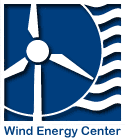I will describe the organization, its members, and the tools and research that AWWI promotes to better understand the risks of wind energy development to wildlife to enable wind energy to reach its potential for reducing climate change. I will also touch on the challenges we face in reconciling the uncertainty in the risks of impacts to wildlife from wind energy projects and the greater risk of catastrophic impacts of unlimited climate change.
Taber Allison is an ecologist with special expertise in wind-wildlife impacts. He joined AWWI in December 2010 to direct all research initiatives. Previously, Taber was Vice President for Science, Policy and Climate Change at the Massachusetts Audubon Society, where he led Mass Audubon’s environmental evaluation of wind energy and climate change. Taber has served at the National Science Foundation, was Director of the Rocky Mountain Biological Laboratory, and taught at Ohio State University and the University of Colorado. Taber serves on the Scientific Advisory Committee of the Bats and Wind Energy Cooperative and is a member of the Bureau of Ocean Energy Management Outer Continental Shelf Scientific Committee. He holds a Ph.D. in Ecology from the University of Minnesota, a Master’s in Forest Science from the Yale School of Forestry and Environmental Studies, and a B.A. degree in Biology from Wesleyan University.

